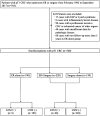Comparative prediction of lymph node metastasis in pT1 colorectal cancer among Western and Japanese guidelines
- PMID: 39544306
- PMCID: PMC11560900
- DOI: 10.3389/fonc.2024.1475270
Comparative prediction of lymph node metastasis in pT1 colorectal cancer among Western and Japanese guidelines
Abstract
Background: Additional surgery with lymph node (LN) dissection is recommended for pT1 colorectal carcinoma (CRC) resected by endoscopy, based on pathological risk factors for LN metastasis (LNM), according to guidelines by the Japanese Society for Cancer of the Colon and Rectum (JSCCR), National Comprehensive Cancer Network (NCCN), and European Society for Medical Oncology (ESMO).
Methods: We retrospectively analyzed 560 consecutive patients with T1 CRC who underwent endoscopic resection alone (n=190) or initial or additional surgery with LN dissection (n=370) between 1992 and 2017 at Hiroshima University Hospital. Patients were classified into LNM low- and high-risk groups according to guidelines by the JSCCR, NCCN, and ESMO as follows. Patients without any specified pathological LNM risk factor were included in the LNM low-risk group, while the high-risk group comprised all other patients. We analyzed the LNM predictive ability of each guideline.
Results: The LNM high-risk rate, sensitivity, specificity, positive and negative predictive values, accuracy of LNM risk, and AUC for LNM predictive ability were 82%, 100%, 19%, 9%, 100%, 26% and 0.596 in the JSCCR guidelines; 52%, 98%, 52%, 15%, 99%, 56%, and 0.749 in the NCCN; and 54%, 98%, 50%, 15%, 99%, 54%, and 0.743 in the ESMO, respectively.
Conclusions: The JSCCR guidelines could diagnose LNM in all cases but had the highest false-positive rate. It is important to reduce unnecessary additional surgeries for pT1 CRCs after ER.
Keywords: T1; colorectal cancer; endoscopic resection; guideline; lymph node metastasis.
Copyright © 2024 Tanino, Yamashita, Morimoto, Takehara, Yamamoto, Kamigaichi, Nishimura, Tanaka, Takigawa, Urabe, Kuwai, Shimamoto and Oka.
Conflict of interest statement
The authors declare that the research was conducted in the absence of any commercial or financial relationships that could be construed as a potential conflict of interest.
Figures


Similar articles
-
An artificial intelligence prediction model outperforms conventional guidelines in predicting lymph node metastasis of T1 colorectal cancer.Front Oncol. 2023 Oct 24;13:1229998. doi: 10.3389/fonc.2023.1229998. eCollection 2023. Front Oncol. 2023. PMID: 37941556 Free PMC article.
-
Utility of artificial intelligence with deep learning of hematoxylin and eosin-stained whole slide images to predict lymph node metastasis in T1 colorectal cancer using endoscopically resected specimens; prediction of lymph node metastasis in T1 colorectal cancer.J Gastroenterol. 2022 Sep;57(9):654-666. doi: 10.1007/s00535-022-01894-4. Epub 2022 Jul 8. J Gastroenterol. 2022. PMID: 35802259
-
Index of estimated benefit from lymph node dissection for stage I-III transverse colon cancer: an analysis of the JSCCR database.Langenbecks Arch Surg. 2022 Aug;407(5):2011-2019. doi: 10.1007/s00423-022-02525-5. Epub 2022 May 2. Langenbecks Arch Surg. 2022. PMID: 35499587
-
Application of machine learning for predicting lymph node metastasis in T1 colorectal cancer: a systematic review and meta-analysis.Langenbecks Arch Surg. 2024 Sep 23;409(1):287. doi: 10.1007/s00423-024-03476-9. Langenbecks Arch Surg. 2024. PMID: 39311932
-
Comparison of the guidelines for colorectal cancer in Japan, the USA and Europe.Ann Gastroenterol Surg. 2017 Dec 19;2(1):6-12. doi: 10.1002/ags3.12047. eCollection 2018 Jan. Ann Gastroenterol Surg. 2017. PMID: 29863118 Free PMC article. Review.
References
LinkOut - more resources
Full Text Sources

